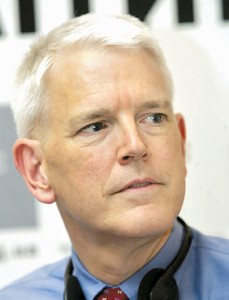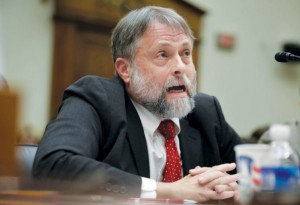Editor’s Note: This feature separates Ukraine’s friends from its enemies The Order of Yaroslav the Wise has been given since 1995 for distinguished service to the nation. It is named after the Kyivan Rus leader from 1019-1054, when the medieval empire reached its zenith. The Order of Lenin was the highest decoration bestowed by the Soviet Union, whose demise Russian President Vladimir Putin mourns. It is named after Vladimir Lenin, whose corpse still rots on the Kremlin’s Red Square, 100 years after the October Revolution he led.
Steven Pifer – Order of Yaroslav The Wise

Steven Pifer, a former ambassador to Ukraine (1998 to 2000) wasn’t in Ukraine when the ill-fated 1994 Budapest Memorandum was signed or serving during the 2004 Orange Revolution, which brought Viktor Yushchenko to power, and the 2013–2014 EuroMaidan Revolution, which drove Viktor Yanukovych from power.
But he has kept a keen and friendly interest in the nation, even if what he says is hard for some Ukrainians to accept.
In an opinion piece in the Kyiv Post published on July 21, Pifer cautions Ukraine against having expectations of membership in the 29-nation NATO military alliance for the foreseeable future.
President Petro Poroshenko, in the wake of a visit by NATO General Secretary Jens Stoltenberg, said on July 17 that Ukraine would seek a membership action plan and wanted to be ready to join by 2020. Most Ukrainians now support joining the alliance. Not surprisingly, more than three years of war against Russia’s invasion have shifted public opinion decidedly into the pro-NATO camp.
However, the alliance is not ready to let Ukraine join. Even if Russia’s war in the Donbas settles down into a frozen conflict of the type the Kremlin keeps going in other parts of the former Soviet Union (Armenia, Azerbaijan, Moldova and Georgia), Ukraine is likely to remain at odds with Russia.
Ukraine will not surrender its territorial claims to either the Donbas or Crimea in the near future, and almost certainly not by 2020.
The hard truth is, as Pifer writes, quoting European Parliament Vice President Alexander Graf Lambsdorff: “The West is not ready to defend Ukraine.”
That is difficult to hear for many Ukrainians, who have seen thousands of their soldiers die defending Europe from Russia. Ukrainians also died on the streets of Kyiv defending, as they saw it, European values, only to have the European Union continue to keep them at arm’s length with little prospect of joining the union.
The time for Ukraine to join NATO was in the early years of the century, when the three Baltic states joined. That opportunity was missed. A similar opportunity will not come for perhaps another generation.
In the meantime, Ukrainians should continue to pay heed to Pifer, who earns this week’s Order of Yaroslav the Wise. True friends speak honestly, even if the truth is painful to hear.
Doug Bandow – Order of Lenin

Doug Bandow, a senior fellow at the Cato Institute and a former special assistant to U.S. President Ronald Reagan, has credentials to be taken seriously on paper.
But in his July 14 opinion piece for Forbes magazine, entitled “Ukraine In NATO? America Should Reject A Bad Idea That Only Grows Worse With Age,” Bandow trots out the same tired old tropes that the Kremlin has been pushing since the Kremlin launched its war in the Donbas in 2014.
The issue of whether Ukraine should be in NATO is controversial.Ukraine would have been better off had it joined NATO as quickly as possible after gaining independence, as the Baltic states did. But that did not happen.
There are good arguments for and against Ukraine joining NATO, but in opposing Kyiv’s accession, Bandow only uses bad ones.
For instance, Bandow states that “historically Washington had little concern about a territory which spent most of the last two centuries as part of either the Russian Empire or the Soviet Union. Ukraine was viewed as a ‘captive nation’ whose liberation in 1991 was warmly welcomed. But its independence, though seen as a moral good, didn’t matter much militarily.”
What should we then say of the Baltics, which among them have three ancient T-55 main battle tanks, all used in Lithuania exclusively for training? They have all joined NATO, but are no military powerhouses. They joined not because NATO was pushing, but because they wisely understood that they would probably face a security threat from the Kremlin in future.
Yet Bandow justifies Montenegro’s accession.
Bandow also seems to forget that Ukraine emerged from the rubble of the Soviet Union possessing the world’s third largest nuclear arsenal. It was the United States and the United Kingdom that persuaded Kyiv to give up this arsenal, in return for security assurances, which then proved hollow. Washington’s failure to recognize Ukraine’s importance to European security has led us into the present situation.
Other Kremlin talking points Bandow spreads include the implication that former Ukrainian President Viktor Yanukovych was overthrown (he abandoned office and was legally removed), and talks of “Russia-supported separatists” rather than Russia’s army of mercenaries, regular soldiers and local collaborators. So Bandow gets this week’s Order of Lenin, for regurgitating Kremlin propaganda and misleading the public about Ukraine.
